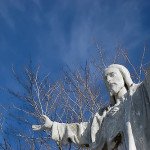We run our website the way we wished the whole internet worked: we provide high quality original content with no ads. We are funded solely by your direct support. Please consider supporting this project.

The Kind of Sin Jesus Publicly Exposes
Image by danny.hammontree via Flickr
Religious sin is the only sin Jesus publicly confronted. The religious variety of the forbidden fruit is the most addictive and deceptive variety. Instead of acknowledging that judging others is prohibited, religious idolatry embraces the knowledge of good and evil as divinely sanctioned and mandated. It gives the illusion of being on God’s side even while it destroys life and hardens people in direct opposition to God.
Religious sin is the most destructive kind of sickness, for it masquerades as and feeds off the illusion of health. Far from being open to a cure, this kind of sickness thrives on the illusion that it is the epitome of health. By its very nature it resists soft correction. Indeed, because it gets life from the rightness of its beliefs and behavior rather than from love, religious sin tends to construe all compassion, accommodation, and unconditional acceptance as compromise. People afflicted with religious sin thus tend to disdain compassionate love, even if it is extended toward them. Hence, Jesus’ approach to leaders who fed off this illusion could not be to gently offer them a cure. Rather, for their sake and the sake of those who blindly followed them, he had to publicly expose their sickness.
What does this mean for the church? The church is called to be the corporate body of Christ that unconditionally loves and embraces all people, regardless of their sin. The only exception to this otherwise unconditional embrace is the sin Jesus confronted in the religious leadership of his day. While all sin is equal in the sense that it separates us from God, sins differ in terms of their impact on people and thus differ in how they need to be dealt with. Religious sin is unique in that it is the only sin that can keep a community from fulfilling the commission to unconditionally love and embrace everyone.
When religious sin infects people, they feed off their judgment rather than love. Where this diabolic delusion is in place in leadership, the kingdom of God is resisted. God’s will can’t be done “on earth as it is in heaven” (Matt. 6:10), for those enslaved to this delusion think they are bringing the kingdom in the very act of preaching their delusion. They preach the fall and think it is salvation. In the name of opening the kingdom, they “lock people out of the kingdom” (Matt. 23:13).
For this reason, religious sin sabotages the whole enterprise of the church when it is found in leadership. It prevents the church from manifesting the loving unity of the Trinity, which is God’s main witness to the world. When a people—especially leaders—gets life from the rightness of their belief and behavior, they will invariably get life by attacking and/or separating from others who don’t see things exactly as they do.
Moreover, since idols never satisfy the hunger that drives us to them, leaders who serve an idol of religion tend to believe they are serving the interest of the kingdom by splitting into increasingly well-defined and ever-shrinking groups.
Hence, while most of the time love requires that we hide the sins of others, the sin of leaders who get life from their religion at the expense of others must sometimes be confronted and exposed. It may be the only hope those who are enslaved to this sin have of recognizing it as sin. It may also be the only way of protecting people who would follow these leaders as well as others who might be harmed by these leaders. Precisely to ensure that it remains a community where outrageous love flows, the church must in love be willing to aggressively confront leaders who are enslaved and enslave others to religious idolatry.
—Adapted from Repenting of Religion, pages 203-205
Category: General
Tags: Judgment, Love and Judgment, Religion, Religious Idolatry, Repenting of Religion
Topics: Following Jesus
Related Reading

Jesus Did Not Teach Ethical Behavior
Image by a2gemma via Flikr Paul teaches that love is not rude (1 Corinthians 13:4–5). If we forget that the New Testament is about the new life given us in Jesus Christ, we easily misinterpret this passage to be an ethical injunction. We read it saying, “Thou shall not be rude.” So in sincere obedience we set…

The Sine Qua Non of the Kingdom
In contrast to the habit of judgment which I challenged in the previous post, God calls his people to love the way that God loves. But what exactly does this mean? People have a lot of screwy ideas about “love” today. We use the word “love” to mean a lot of different things, from sexual…

Depression and Willpower
In Greg’s book Escaping the Matrix, he and his co-author discuss the topic of depression. Having experienced first hand the effects of depression, we, the editors at ReKnew, recognize that this short post cannot address the complex realities associated with it. There are no easy answers. However, we wanted to offer this short excerpt in…

The Idolatrous Devotion to Inerrancy
Luca Rossato via Compfight Ed Cyzewski posted some thoughts on his blog on why he hates the word “inerrancy”. He agrees with something Greg has been saying for a while now that seems shocking to many: fighting for the idea of inerrancy can devolve into a kind of idolatry. This is well worth the read if…

Podcast: Would a Loving Messiah Call a Woman a DOG?!?
Greg talks about why Jesus would say such apparently cruel things to some poor Canaanite woman. Oh, he also tells a joke about hamsters. http://traffic.libsyn.com/askgregboyd/Episode_0202.mp3

A Jesus Kind of Church
The church can only be the conduit of God’s love if it stops judging others (See yesterday’s post). This means that it will stop being concerned about its reputation in the eyes of those who practice this religious judgment. The only reputation we need be concerned with is to have the one Jesus had. He…
